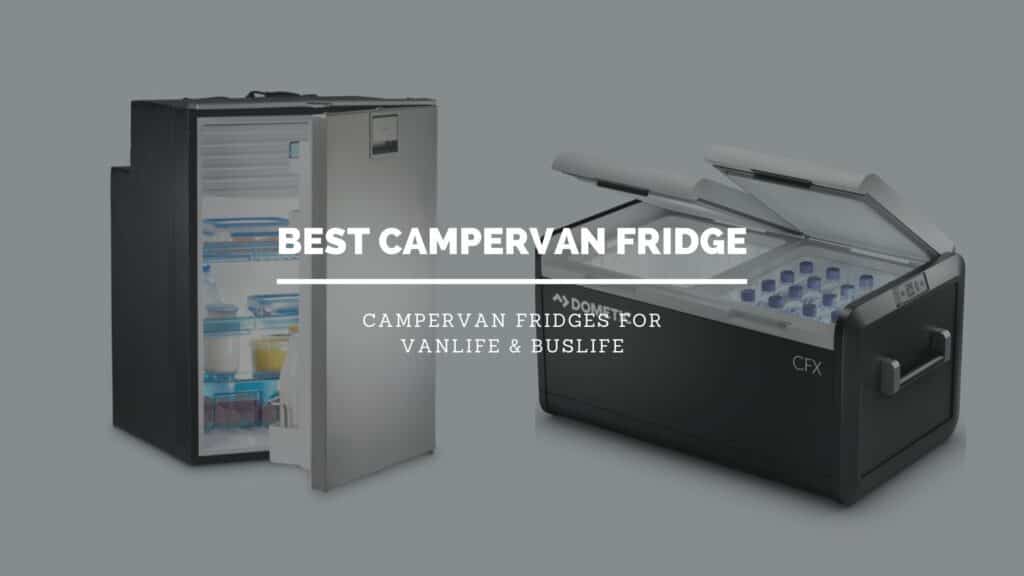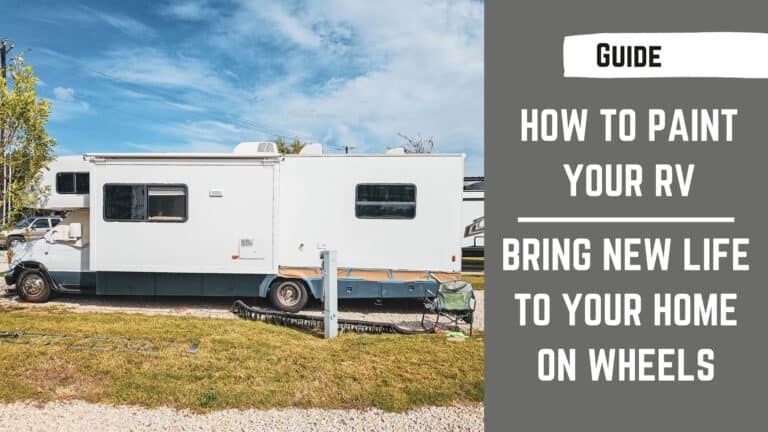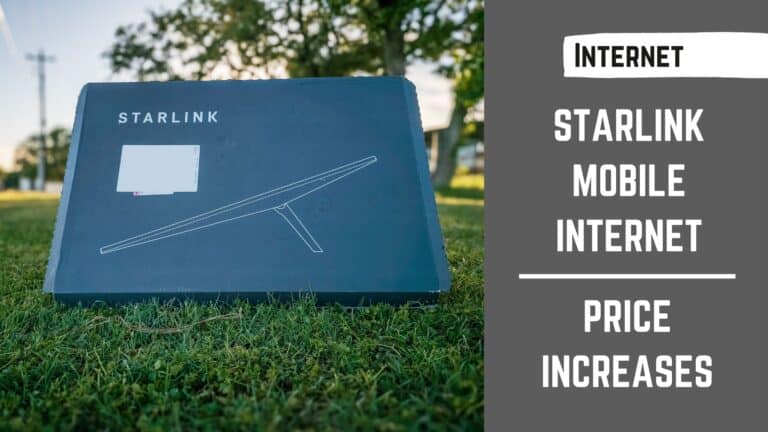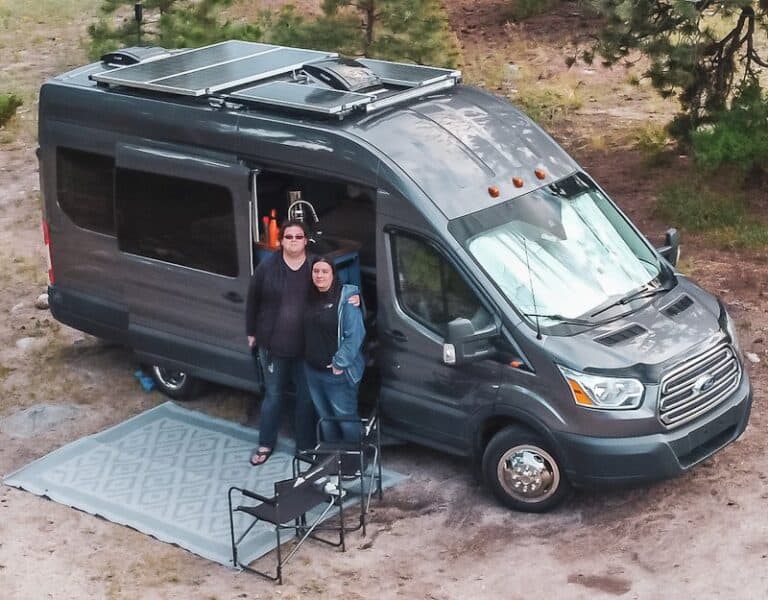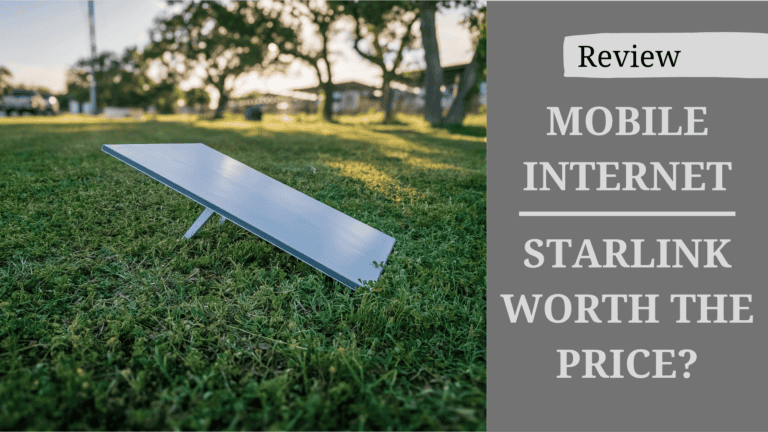Having a campervan fridge for full-time vanlife is a must in our opinion. While you might get by with just a cooler and a few bags of ice while on a short weekend trip, living and traveling full-time in a van or a bus conversion is different.
When we first started looking at what campervan fridge we should get, we got overwhelmed by all of the available options. What would work best for us? How much power does each type of fridge draw? Will our batteries be large enough to run a larger fridge with a freezer? Luckily the answers to these questions are not as hard as we first thought they were.
Should You Have A Campervan Fridge For Vanlife?
YES! A campervan fridge will make your travels more enjoyable and help make your van feel like home. There are so many reasons to have a campervan fridge in your van or bus conversion.
When living vanlife or buslife full time, you will want the ability to bring more fresh food with you and have it last longer without the need of constantly adding more ice to a cooler. Plus, if you get a camper van fridge with a freezer, you can store food for extended periods, and you can have ice cream!
Bringing more fresh foods with you will allow you to stay at your camp spot longer before running back into town to restock.
Plus, having a campervan fridge will help make your van conversion feel more like home. Having your favorite cold drinks whenever you want, having everything you need while cooking, and having ice cream in your van make for more comfortable travels.
What Makes A Campervan Fridge Different From A Household Fridge?
Campervan fridges can be expensive, with some costing just as much as a low-end household fridge. So what makes a campervan fridge different from a household fridge, and why can’t you use one of those $100 dorm mini-fridges in your van?
The high cost of fridges for vanlife and buslife comes down to how the refrigerator is powered.
Household refrigerators (including dorm fridges) are all powered by something called 110v electricity. In a nutshell, 110v power is what every house and apartment in the United States uses, it’s what powers all of the outlets, and it is what most household appliances use.
The issue with 110v power is that it’s incredibly inefficient. So why do we use 110v here in the States? The simple answer is that 110v electricity travels better on powerlines and does not cost as much to transport.
The inefficient nature of 110v power is why we recommend not to use a household fridge in your van or bus as they draw way more power than a 12v fridge does, meaning you’ll need a larger battery bank.
How does this all tie into what makes a campervan fridge different from a household fridge? Campervan fridges are designed to be powered by either a 12v power source or by propane. Plus, a fridge for vanlife has to be more compact and designed to withstand constant micro-vibrations from driving along with a greater range of operating temperatures due to most vans not having air conditioning.
All these design challenges set a campervan fridge apart from a household unit and contribute to the high prices.
7 Things To Consider When Buying A Campervan Fridge
Choosing a campervan fridge for vanlife isn’t as easy as running down to the local department store and picking a refrigerator out that looks nice and fits your space. There are a whole host of considerations to take into account.
1. What size fridge should you get for vanlife?
First off, what size fridge should you get for van life? Unfortunately, there is no clear-cut answer to that question, as it depends on how you plan to travel. If you plan to stay close to towns and cities where you can go to the grocery store every few days, you could easily go with a smaller fridge.
Alternatively, if you are interested in exploring more backcountry camping areas where running into town for supplies is not as easy, you’ll probably want a large fridge with a sizeable freezer.
Not only does the style of travel you are planning on have an effect on what size fridge you should go with, but the size of your van does, too. If you are in an extended wheelbase van or a skoolie, you will have more room for a large fridge than a short wheelbase van, where you have to think about every inch of space more.
In our van, we have a 95-liter fridge and freezer. It is a big fridge, and it takes up a lot of space, but when fully stocked, we can easily last close to two weeks before going to the grocery store. One thing to note, most smaller campervan fridges are single zone, meaning they are only a fridge. You will need to go with a larger fridge for a dual zone (fridge and freezer).
Some of the most popular campervan fridge sizes are
- 25 liter, single zone
- 45 liter, single zone
- 75 liter, dual zone
- 95 liter, dual zone
2. How Much Does The Fridge Draw?
If you plan to have your campervan or bus conversion be completely self-sustained and off-grid, then power draw could be a deciding factor. The more power your fridge draws, the larger your battery bank will need to be. Not only that, but you need more solar panels to recharge your batteries during the day.
Luckily, most camper van fridges draw very little power and run off the same 12v power that most campervan batteries provide. Still, if you will have only a small solar setup for your build, you will need to consider power usage so that you do not continually drain your batteries too low.
3. Chest, Upright, or Drawer Style Campervan Fridge?
There are three types of campervan fridges available. Each has its own advantages and disadvantages.
Chest Style Campervan Fridge
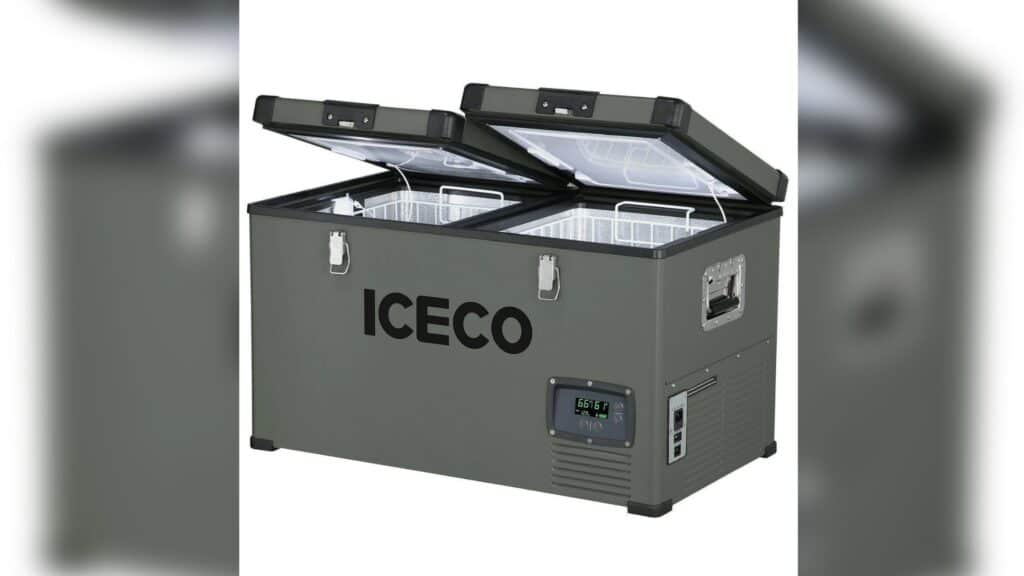
Chest-style fridges are by far the most efficient type of campervan refrigerator. The chest style is the most efficient type of van life fridge due in part to how heat rises and cold air sinks. So when you open a chest-style fridge, all the cold air stays inside the fridge instead of spilling out of the door; less cold air escaping means the unit does not need to run as often.
The biggest advantage of chest style fridges is their capacity. With an upright fridge, you are limited to only the space on each shelf, whereas with a chest, you can easily stock items on top of each other, meaning you can fit more items inside.
Pros
- Is more power-efficient
- It takes up less vertical space
- It can be hidden in couches or cabinets
Cons
- It takes up more floor space
Upright Campervan Fridge

Upright-style campervan fridges look the most like a standard refrigerator in a house. The door is located on the front of the fridge with shelves inside, making it easier to see what all you have in your fridge compared to a chest-style fridge.
The main advantage of an upright camper van fridge is that they take up less floor space than a chest style does. They can be easily installed underneath your countertop, like how a dishwasher is installed in a house. The issue with upright campervan fridges is whenever you open the door to grab something, the cold air inside is able to escape. Meaning the fridge will need to run more often.
Pros
- Easier to see what’s inside
- Often, upright fridges are cheaper
- It can be installed under a countertop
Cons
- Less energy efficient
- It has to run more often
Drawer Styler Campervan Fridge
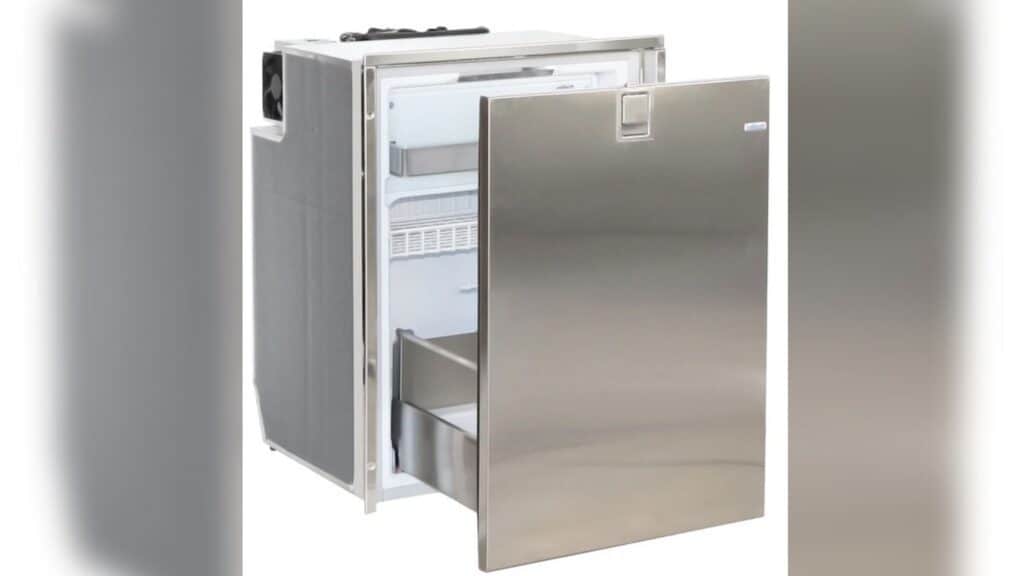
Drawer-style campervan fridges are a mix of both upright and chest-style refrigerators. They look like an upright fridge, but when you open them, the entire inside slides out on a drawer, making them by far the least efficient type of refrigerator for vanlife.
Not only do you lose all of the cold air inside whenever they are opened, but they also typically only have one shelf inside for food storage.
Pros
- It can be installed under a countertop
Cons
- Less power efficient
- Not as much usable space inside
4. Compressor VS Propane Powered
The two main cooling technologies used in campervan fridges are 12v compressors and propane. The only difference between the two types of fridges is that a 12v fridge uses electricity, while a propane fridge uses LP gas.
By far, 12v fridges are the most common type of campervan refrigerators, mainly because they work so well and typically draw little power. If you see a fridge listed as a two-way fridge, that means that it can be powered by either 12v power or propane. Three-ways fridges are the same but can also use 110v power.
5. Does The Fridge Fit Your Campervan Layout?
It’s easy to get caught up in all the details of a van build, what fridge to get, how much solar you need, and what kind of toilet you will use? It is easy to get carried away and start looking at each part as a separate item, comparing all the different choices and going with the best of each item: the best fridge, the best battery, the best toilet.
It is essential to step back now and then to remember that the best campervan fridge comes down to what will work for you. Everyone has their own opinions on everything, but ultimately, you will be the one using your van daily, so make sure your layout is what you want. Don’t be afraid to take some time to figure out what campervan layout will work best for you, then you can match the gear to fit that layout.
If you start to design your van build around the appliances instead of the living space, you will end up being unhappy with the van, and your travels may get cut short as your campervan does not work for you.
6. Do You Want A Freezer? (Ice Cream!)
Perhaps the most straightforward choice when choosing a campervan fridge is whether you want a freezer or not. We all know the advantages of having a freezer: being able to store food for longer without it going bad, frozen veggies, ice for cold drinks, and ice cream!
We decided to have a freezer in our van. In our 95L chest-style fridge and freezer, we can fit:
- 10lbs of meat
- 10+ bags of frozen veggies
- 3 frozen pizzas
- 2 quarts of ice cream
Our freezer capacity, combined with our fridge space, allows us to go about a week and a half to two weeks before needing to go to the grocery store again.
7. Price
Price is a significant deciding factor when choosing a fridge for van life. Camper van fridges can get expensive depending on your desired size and features. Most dual-zone (fridge and freezer) units cost around $1,000, with smaller single-zone fridges costing about $300.
A campervan fridge will be one of your four main costs when converting a van for vanlife. The others will be your electrical system (including solar), insulation, and the van itself. So while the price of most 12v fridges can be a shocker when first looking, just know that a good fridge is a worthwhile investment into your van.
What Is The Best Fridge For Vanlife?
As you can see, there is much to consider when choosing a campervan fridge for your vanlife adventures. Unfortunately, there is no clear-cut answer to the best campervan fridge. While that may be frustrating or even overwhelming if you are starting to research and learn about what goes into a van build. Not having a set answer is actually something that is good and will help with your planning.
Instead of getting all caught up in the details of what fridge can hold what and which one draws the least power, focus on the layout and design of your van. Make sure your van will work for you and that you will be comfortable and have everything you need for traveling, work, and day-to-day living.
Once you have the layout and design of your van all figured out, return to this page and see what fridge will work the best for you. Ultimately the best fridge for vanlife is whatever works best for YOUR vanlife.
Our Picks For Best Campervan Fridges For Vanlife & Buslife
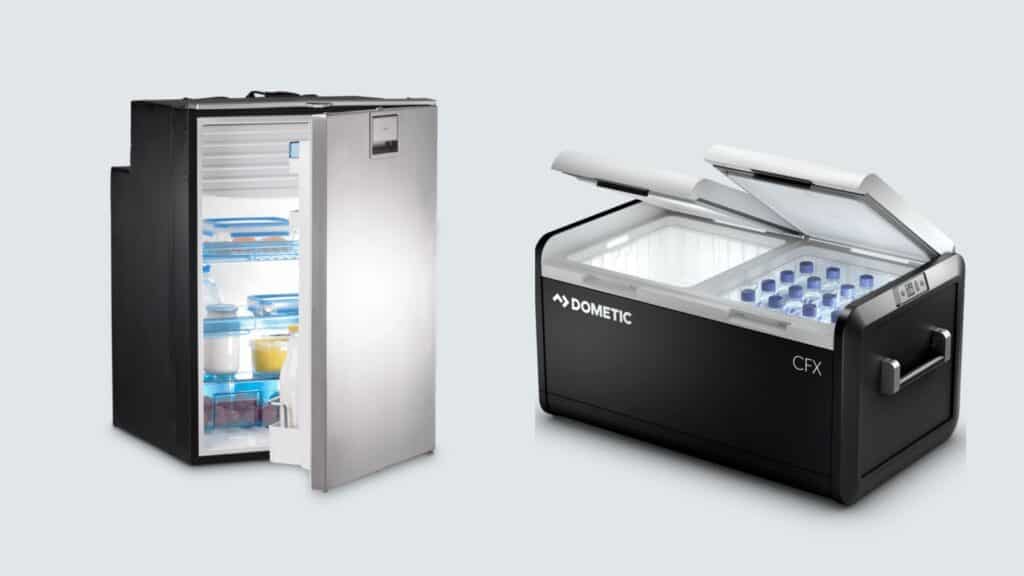
Our top two picks for a campervan fridge are the Dometic CRX upright or the CFX chest-style fridges. We have the Dometic CFX95DZ (chest style, 95-liter duel zone) fridge in our campervan and love it.
We can easily store close to two weeks’ worth of food in the fridge and the freezer and often still have some room to spare, we can even fit multiple gallon jugs in the fridge. The CFX series campervan fridges draw very little power considering their size, which helps our batteries last longer.
The CFX is not without issues, though. In the past, on hot days, we’ve had problems with the built-in fuse on the CFX going bad, causing the fridge to run at max current while not being able to cool off. We believe it to be an air circulation problem and have added a computer fan to where the fridge is to help air circulation.
Dometic’s CFX campervan fridge works best for us in our van build as we can hide the fridge under our sofa. If we were to do another campervan layout where the refrigerator can not go under the couch, we would use the Dometic CRX upright fridge instead.
Dometic CFX3
- Chest style
- Comes in multiple sizes
- Duel zone and single zone options
- Large freezer
- Bluetooth enabled
- Can be easily removed
Dometic CRX
- Upright style
- Under-counter or apartment sizes are available
- Permanently installed
- Low power usage
Tips For Vanlife Refrigeration
While 12v refrigeration is amazing and constantly improving, you should know a few things.
12v Fridges need good airflow: You can’t just stick a 12v fridge anywhere you want in your van. Upright camper van fridges will need an air gap on all sides. They also have a vent on the front of the refrigerator that needs to be unobstructed for them to work correctly. Chest-style fridges need airflow around the entire fridge to prevent heat buildup. Airflow is even more critical on the side of the fridge that has the vents.
We recommend adding a computer fan to the area where you install an upright or chest-style fridge to help with ventilation. The better ventilation your camper van fridge has, the better it will run.
12v fridges can have a hard time when close to empty: 12v fridges have a hard time maintaining temperature when there is little to nothing inside them. Without some items in the fridge or freezer, you may find your campervan refrigerator running more than it usually does.
We always go grocery shopping once our fridge or freezer is running a bit low. That way, our fridge never has to work extra hard to maintain low temperatures.
TL;DR
Having a campervan fridge is a significant quality of life improvement for any vanlife or buslife adventure. In our opinion, the best campervan fridge is the one that works best for your style of travel and the layout of your van.
Currently, we have a 95-liter chest-style fridge in our extended-length camper van that works for our needs and layout. If we were to change our layout, we would consider an under-counter upright fridge.
What you need to know about campervan fridges:
- Campervan fridges can be expensive, especially the larger ones with a freezer. Think of your campervan fridge as one of the four major costs of building a van, the other three high-cost items being your solar system, insulation, and the cost of buying the van.
- They come in all sizes, from small chest styles to larger apartment-sized fridges.
- Camper van fridges can be propane-powered or 12v-powered. We recommend 12v fridges as they run better and do not draw much power.
- Having a camper van fridge allows you to store fresh food for longer.
- Having more food storage means being able to stay at our campsite for longer before needing to make a grocery run.
- If you have a freezer, you can have ice cream.
- Overall, having a campervan fridge helps make your van feel more like home.
